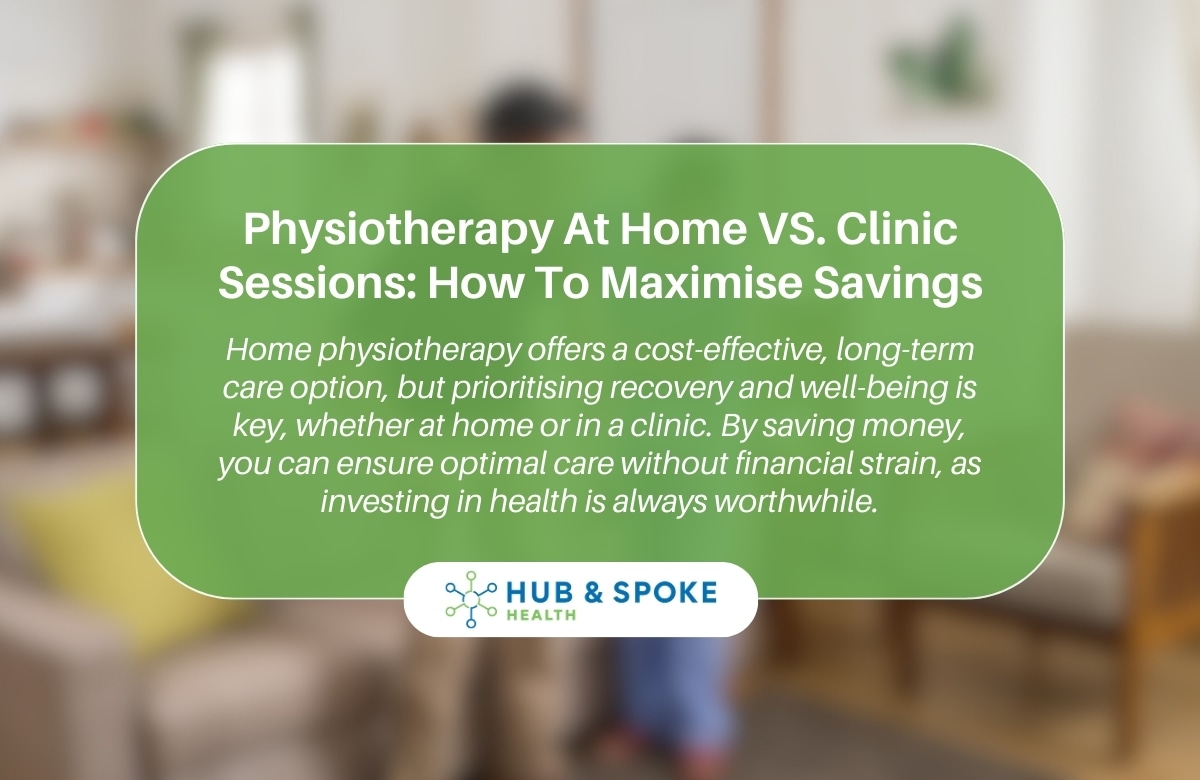Physiotherapy At Home VS. Clinic Sessions: How To Maximise Savings
Are you considering physiotherapy to aid your recovery or manage a chronic condition? One aspect to contemplate is whether to opt for in-clinic sessions or physiotherapy at home. Each option has its benefits, so it’s essential to weigh them carefully to ensure you’re getting the best care suited to your needs.
Physiotherapy is an integral part of your healing journey, offering convenience and personalised care. Having therapy at home eliminates the hassle of travel, saving you time and providing a comfortable environment for your rehabilitation. Whether you choose a clinic visit or home-based sessions, prioritising your convenience and well-being ensures you make the most of your physiotherapy experience, helping you achieve your health goals effectively.
7 Benefits of home-based physiotherapy vs clinic sessions
In today’s hectic world, having easy access to top healthcare services is crucial. Home physiotherapy is a professional service that provides the benefits of physiotherapy to people in the comfort of their own homes, offering the following benefits:
1. Comfort and convenience
One of the key benefits of home physiotherapy is the convenience it provides. Patients can receive treatment in the familiar and comfortable setting of their own homes, avoiding the need to go to clinics or hospitals. This convenience is especially useful for people who have limited mobility or face transportation issues.
2. Personalised care
Home-based physiotherapy provides highly customised service that is tailored to each patient’s specific needs. Physiotherapists can examine the home environment, comprehend the patient’s individual issues, and tailor therapy plans accordingly. This tailored approach guarantees that patients receive focused interventions to maximise their functional capacities and improve their quality of life.
3. Flexibility in scheduling
Home physiotherapy, as opposed to traditional clinic treatments, allows for greater scheduling flexibility. Patients can plan appointments at times that work best for them, giving them more flexibility in managing their calendars and responsibilities. This flexibility is especially useful for people who have multiple health-related appointments in their day.

4. Family involvement and support
Home-based physiotherapy promotes family involvement and support throughout the treatment process. Family members can actively participate in therapy sessions, learn ways to help their loved ones, and offer continuous support and encouragement. This collaborative approach creates empowerment and leads to better patient outcomes.
5. Cost-effectiveness
Home physiotherapy can be an affordable choice for patients and their families. Home physiotherapy can save money over time because it eliminates the need for transportation to clinics and lowers the overhead expenses associated with clinic-based therapies.
Furthermore, home-based interventions may avoid the need for more extensive and costly interventions in the future by addressing problems early on and supporting optimal health and mobility.
Home-based physiotherapy can potentially be more cost-effective than clinic-based sessions for several reasons:
- Reduced travel expenses: You eliminate the cost of gas, public transportation fares, or parking fees associated with travelling to the clinic.
- Fewer missed appointments: Scheduling can be more flexible at home, reducing the chance of missed appointments that may incur cancellation fees.
- Reduced need for assistance: For those with limited mobility, avoiding travel eliminates the need for help (aides) getting to and from appointments.
- Shorter treatment duration: Home physiotherapy can help manage chronic conditions and prevent future flare-ups, reducing the need for further medical intervention. This could potentially lead to fewer total sessions and additional medical expenses.
6. Improved motivation and treatment adherence
Patients who receive in-home physical therapy frequently report increased levels of motivation and adherence to their treatment programs. Patients feel more at ease and secure in their own homes, which encourages them to actively participate in their therapy. This enhanced desire and participation may result in improved treatment outcomes and patient satisfaction.
7. Prevention of hospital readmissions
Individuals with impairments or chronic health conditions benefit greatly from home physiotherapy in reducing hospital readmissions. Physiotherapists can assist patients in preserving their functional abilities, controlling symptoms, and avoiding hospitalisation by offering continuing rehabilitation and support services in the home.
As a result, participants have fewer emergency room visits and hospital readmissions, resulting in significant cost savings for the healthcare system.

Final thoughts
Overall, home physiotherapy can be a strong contender for long-term, cost-efficient care. Whether you choose to do physiotherapy at home or in a clinic setting, the most important thing is to prioritise your recovery and well-being. Both options have their advantages, and it ultimately depends on your individual needs and preferences.
By maximising savings, you can ensure that you are getting the best care possible without breaking the bank. Remember, investing in your health is always worth it in the long run!
Book an appointment with us today! Our experienced team will lead you down the best treatment path for your recovery.
source https://hubandspoke.health/physio-at-home-vs-clinic-sessions/
Comments
Post a Comment